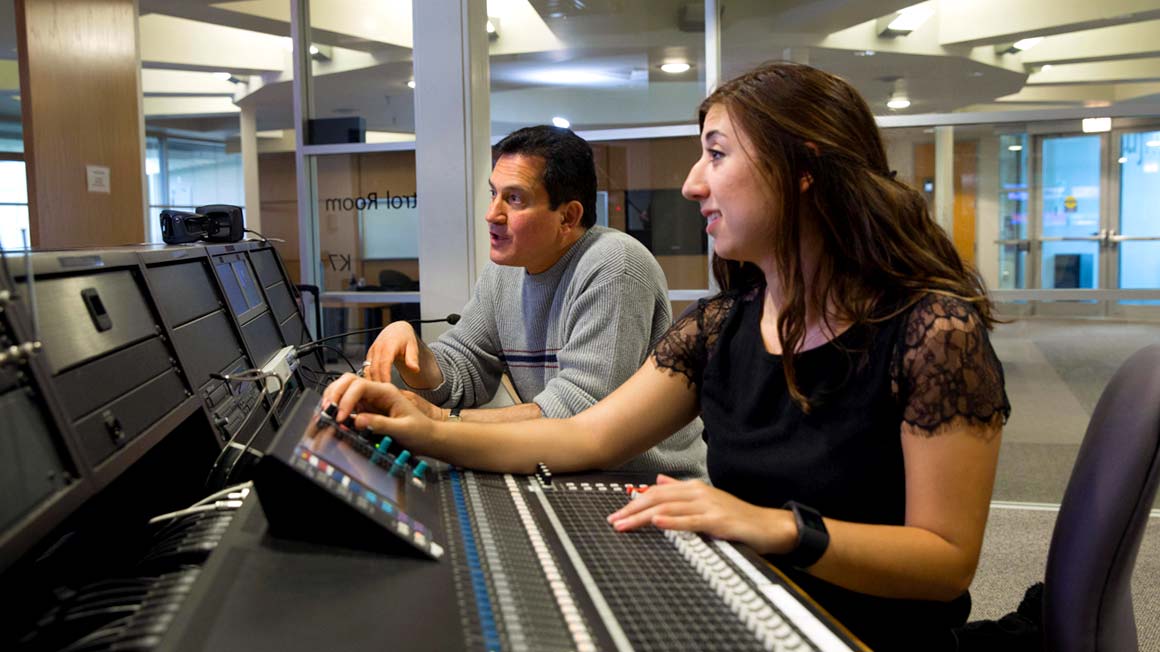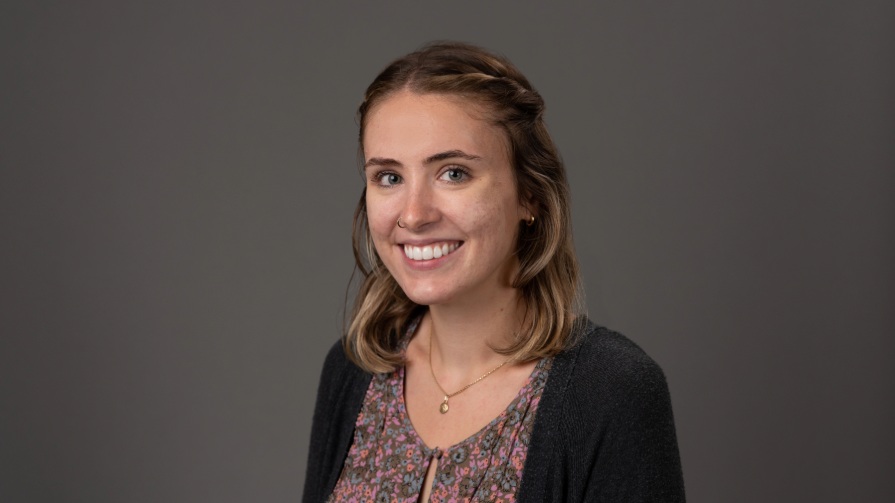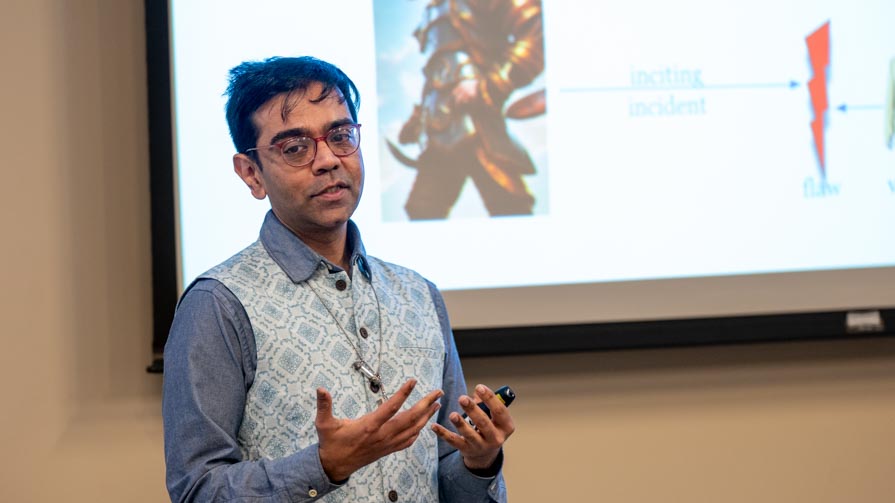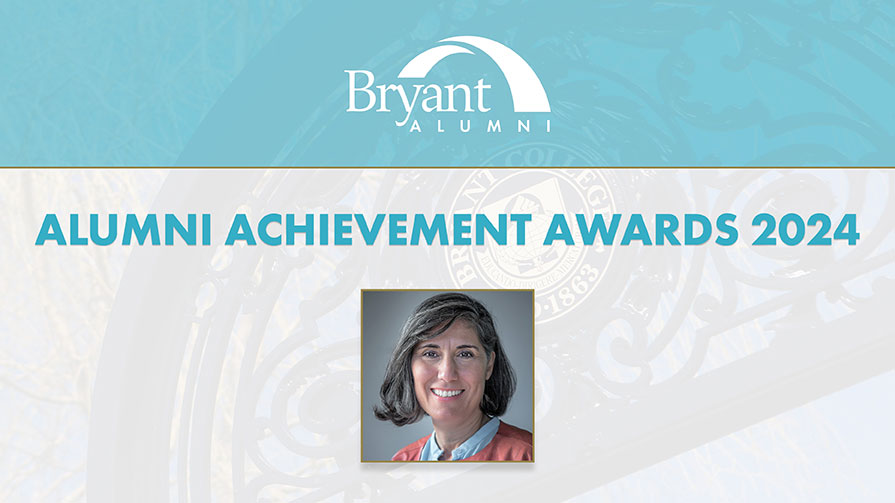A longtime news veteran with experience across a variety of mediums, Senior Lecturer in Communication Tom Zammarelli knows what it takes to get the story. Through Bryant’s Broadcast Journalism specialization, Zammarelli and his colleagues prepare the next generation of journalists to report news and understand an increasingly broad and fast-evolving media landscape.
“We’re teaching students to be broadcast journalists, but we’re also teaching them how to work in the broader media industry at a higher level,” Zammarelli explains. “Yes, we teach our students skills like how to run a camera, or how to run an audio board, or even how to act on-air. But we’re also doing more than that. We’re trying to help them understand the media business itself, and help them look ahead.”
"Bryant's broadcast journalism specialization provides our students with the resources and guidance to fully explore the media landscape and prepare for distinguished careers," says Provost and Chief Academic Officer Glenn M. Sulmasy, J.D., L.L.M, who was instrumental in securing the specialization's recent equipment upgrades. “Journalism is a key element of a democracy, and our program enables students to take their place at the forefront of this vital field.”
Thinking ahead
The broadcast journalism program is helping Communication major Robert Simoneau ’21 learn how to navigate the new media landscape and develop traits and skills that will help him excel anywhere. Courses in subjects such as studio production and video journalism have taught him how to write, film stories, and create broadcast and digital news content. In a Field Production course with Communication Lecturer Tom Dooley, Simoneau created his own news broadcast as a final project.
“That was a lot of fun,” he remembers. “I learned so much from being able to create something like that on my own.”
“Having the opportunity to be able to actually produce something like this before I am even done with my junior year of college, that's actually kind of amazing."
Letting students work on practical projects is one of the hallmarks of the specialization, says Zammarelli. "One of the best things about Bryant’s program,” he notes, “and what really separates us from other places, is that you get to work with all of the gear from first semester freshman year on.”
News you can use
Through the program, students learn about communicating across a wide range of media, from traditional TV broadcasts to web videos, and how to tailor their presentation to each. But the core remains the same. “The media business itself has changed a great deal, not only in terms of content but in terms of distribution. You have to be ready to put your content out on a variety of platforms,” says Zammarelli. “But you can't get caught up in it. The content is what still matters in the end. If you can tell a good story, you're going to have your viewers.”
Producing that content means knowing how to write, how to gather information, how to interview, how to professionally present and, most importantly, how to work as a team. “Whether you want to go in to television, or the media industry, or even something else entirely, the broadcast journalism specialization teaches you so many important skills that you can use anywhere,” says Simoneau.
Doing it live
In his “The Newsroom” course, Simoneau’s putting everything he’s learned together by helping to produce a weekly live news broadcast run entirely by students. They film in Bryant’s top-of-the-line television production studio, which was recently upgraded with new camera equipment and a Tri-Caster TCI video production system that lets them upload live reports and broadcasts from anywhere in the state.
“He would sit with you and explain what went well, and what didn't go well, and where you can improve. He didn’t just give you a grade, he gave you an explanation and support that would help you do better next time."
“Having the opportunity to be able to actually produce something like this before I am even done with my junior year of college, that's actually kind of amazing,” he says. “It's an exciting feeling to know that people literally around the world can see and hear us, and see the work that we’ve put into this.”
Ready to perform
Practical experience is a powerful tool, explains Zammarelli. “I can talk to students about a subject, like how to interview, but it's really, really important for them to actually practice it,” he explains. “They need to interview real people in real time.”
That focus on real-world learning made a real difference for Stephanie Johnston ’16, now a web content producer with CBS Boston Local Digital Media. In her job, Johnston needs to be able to write, interview, tell compelling stories, and adapt on the fly. Her Bryant education, she says, gave her the foundation to do all of that. “So many of the classes that I took at Bryant involved hands-on learning and that’s what real life is – hands on,” says Johnston. “In real life, you need to be able to perform.”
She remembers a course on interviewing with Communication Instructor Mike Montecalvo, an award-winning journalist with the WPRI 12 and Fox Providence television stations, as being especially helpful. “He would sit with you and explain what went well, and what didn't go well, and where you can improve,” says Johnston. “He didn’t just give you a grade, he gave you an explanation and support that would help you do better next time.”
“Journalism is important. It matters to people, and it matters in their lives. If everyone has the right information, and knows what's going on around them, then we can be better citizens and better people.”
Those lessons have stuck with her. “That class was such an important learning experience for me, and I still think about it when I'm interviewing someone,” she says. “Because of that course, I know what questions to ask and how to ask them.”
Competitive advantage
In Zammarelli, Johnston found a dedicated mentor who helped her examine her options, find her path, and secure important internships and, later, jobs.
"I'm very candid with my students. I tell them this is a competitive business, and it's a lot of work,” says Zammarelli. “But we’re going to do everything we can to give you that competitive advantage and help you get there, whether it be through classes, through internships, or through meeting with alum in the field,” he says.
For Johnston, that advantage has led to a career doing something she loves. “This is something I've always wanted to do,” she says. “Journalism is important. It matters to people, and it matters in their lives. If everyone has the right information, and knows what's going on around them, then we can be better citizens and better people.”






